Triple Triad is Final Fantasy VIII’s premier mini-game, a card game that’s the obsession of many characters throughout the game. Not only is it a fine diversion in its own right (who can resist the temptation to collect cards?!), but you can obtain great reward by refining cards you win via Quezacotl’s Card Mod ability. First, however, you have to win those cards, so lets discuss the rules of Triple Triad.
(1 of 4) When an enemy card has a vulnerable side exposed
Triple Triad Basics¶
The basic gameplay of Triple Triad is simple. Each player will pick five cards to form their hand and will take turns placing these cards on a 3x3 grid from whence the game presumably derives its name. Whomever has the most cards in their possession (not necessarily on the board) at the end of the game wins. To keep this from being a simple coin-toss affair, however, each card has different strengths and weaknesses, as represented by the numbers on each side of the card. When a card is played adjacent to a card controlled by an opposing player, the two adjacent sides are compared and if the played card’s number is higher, the opposing card is flipped, changing control to the other player.
Some notes on how this works:
-
The values on the sides of cards range from 1 (lowest) to A (highest).
-
Typically only the card that was played any given turn can flip other cards. Cards that are already on the board won’t flip other cards, even if a card is played against a weaker adjacent side.
-
Multiple cards can be flipped by a single card, if the numbers on multiple adjacent sides are stronger.
-
A card that was flipped does not challenge the sides of adjacent cards unless the Same/Plus rules are active.
-
Players do not flip the cards they control, although if an opponent takes control of a card you possess, you can potentially flip it back by playing another card with a stronger side adjacent to it.
-
Cards you control have blue backgrounds, cards the opponent controls have red backgrounds.
-
The player who plays a card first is randomly determined at the start of each game.
For the core rules, that’s all there is to it. You pick five cards and try to place them on the 3x3 grid so that the weak sides of your cards are protected, while taking advantage of the weaker sides of your opponent’s cards, as the situation demands. Most matches - especially as you gain numerous rare cards - can be won through sure card superiority, but of course there’s more to it than that… at least when you start encountering new rules, which is the subject of the next section,
Triple Triad Game Rules¶
The advanced rules are where Triple Triad starts to really get complicated, but ideally you’ll want to avoid spreading those rules, hence keeping your card games as simple as possible. But that in itself is a whole other subject for a future header. For now, just know that Triple Triad rules vary by region, and they’re… well, frankly like a communicable disease in that when you play games with said rules, you can become a carrier of those rules. Different regions across the world have different rules, and if you bring foreign rules to a region, you’ll be offered to play with a mix of the rules you’re carrying and the native rules. Refusing repeatedly will make the native character stop offering to mix rules and you’ll default to playing with only that region’s rules, but if you play a game with mixed rules, you may spread a rule you are carrying to that region, or you may abolish a rule from the region.
Again, this will be covered in greater detail shortly, but for now let’s focus on the rules each region plays by, and the rules themselves:
| Region | Starting Rules |
|---|---|
| Balamb | Open |
| Centra | Plus, Random, Same |
| Dollet | Elemental, Random |
| Esthar | Elemental, Same Wall |
| Fisherman’s Horizon | Elemental, Sudden Death |
| Galbadia (includes Timber) | Same |
| Lunar Base | Elemental, Plus, Random, Same, Same Wall, Sudden Death |
| Trabia | Plus, Random |
Combo: A rule that automatically accompanies the Same and Plus rules. If a card is flipped by the activation of either Same or Plus, that card counts as if it were just played and may also flip adjacent cards. This rule will not appear in the rules list - if Same or Plus are active, so is Combo.
Elemental: When the Elemental rule is in play, elemental icons will appear on some tiles on the 3x3 Triple Triad board. If a card is played that has the same element as the element on the board, its side will gain a bonus to their strength, while if you play a card that has no element or the wrong element on an elemental tile it’ll suffer a penalty. Since only around 1/3 of the Triple Triad cards have any element whatsoever and there are multiple element types that can appear on the board, the Elemental rule effectively means that, on average some cards will just be weakened during the course of play. Not a very important rule, nor one that really changes the game much.
Open: The only rule you’ll start with, and one of the few rules you’ll want to spread around the world. It’s a good kind of disease - for card games! The Open rule simply allows you to see what cards your opponent has in their hand while they play, which makes predicting their moves and adjusting your own much easier. It also lets you know at a glance whether an opponent is playing a rare card, which is always welcome.
Plus: When a card is played while the Plus rule is active, the sum value of its sides and the sides of adjacent cards is added, and if the values of at least two adjacent sides (one of which must be an opponent’s card) are the same, the aforementioned opponent’s card(s) are flipped. Playing a stronger card side against a weaker opponent’s card will still flip it as per the normal rules. A card flipped with Plus follows the Combo rule, counting as if it were itself freshly played, potentially flipping other adjacent cards.
Random: Instead of picking five cards of your choice to form your hand, five cards are randomly selected from your library (the collection of all cards you possess) to comprise your hand instead. This is a massive handicap for the player and should be abolished at every opportunity. Failing that, you’ll need to refine weak cards and generally keep your library of cards small to increase the odds that better cards will be picked.
Same: When a card is played while the Same rule is active, if the sides of the played card are the same as the sides of at least two adjacent cards (one of which must be an opponent’s card), the aforementioned opponent’s card(s) are flipped. Playing a stronger card side against a weaker opponent’s card will still flip it as per the normal rules. A card flipped with Same follows the Combo rule, counting as if it were itself freshly played, potentially flipping other adjacent cards.
Same Wall: The four boundaries sides of the 3x3 Triple Triad board are considered to have the value of (A) for determining whether the Same rule activates.
Sudden Death: If a game ends in a tie, a rematch immediately starts afterwards. Each player will begin the next match with whatever cards they had in their possession at the end of the previous match. This will continue indefinitely until somebody wins.
(1 of 3) Challenge the Card Queen in Balamb
Triple Triad Trade Rules¶
Those are all the game rules, but there are also trade rules which are worth discussing. Typically the winner of a game of Triple Triad gets to claim one of the loser’s cards, although there are various means of determining which an how many cards the winner acquires at the end of a game. The default trade rule is “One”, which stipulates the victor takes one card from the vanquished, and by playing cards normally you probably won’t see the trade rules change too much, even while playing cards across different regions. That said, it can sometimes be advantageous to change these rules, which the Queen of Cards can facilitate. More on her later, but first, the rules:
All: The winner takes all the loser’s cards. While lucrative, this rule will eventually devolve to the “Direct” rule after a random number of games.
Diff: The winner is able to claim an increasing number of cards the greater the margin of victory. A 6-4 victory grants the winner two cards, a 7-3 victory entitles them to claim four cards and a victory margin of 8-2 or better will forfeit all cards to the victor. This rule will eventually devolve to the “One” rule. Easy come, easy go…
Direct: Each player keeps the cards that were under their control at the end of the game. Easily the worst trade rule, it makes it considerably more difficult to win the cards you want… at least, without losing any of your own.
One: The winner takes one card from the loser.
To change trade rules you’ll need to play the Queen of Cards, who will adopt a random trade rule when you play. You can simply challenge her to a game, view the rules she’s using, and if she’s not using a trade rule you like, simply exit without actually playing her and try again. When she uses a trade rule you favor, play a game with her and that should set the trade rule in the region for the foreseeable future. As long as the Queen of Cards is in a region, the players there will occasionally adopt her trade rules, but if you want to force the rules to change again simply repeat the process above.
Speaking of the Queen of Cards, she’s a rather important component to Triple Triad and even has her own side quest, so she’ll be our next subject.
The Queen of Cards¶
The Queen of Cards is an enigmatic player from Dollet who “travels all over the world to monitor and enforce the various card rules.” Her words. And it’s not just empty boasting, either, as the trade rules she uses will influence the trade rules of the entire region she’s in. As stated earlier, just challenge her to games until she uses the trade rules you want, and when said rule appears, win a game against her (surprisingly, she doesn’t tend to have very good cards) after which you should have become a carrier of the trade rules you used in the game against the Queen of Cards, and those same trade rules should be set as the trade rules the Queen of Cards will influence the entire region to randomly adopt.
You’ll originally find her in the train station outside of Balamb, and aside from manipulating trade rules, she’ll also offer (pick the dialogue option This region’s rules) to spread game rules… for a price. To spread a new rule costs 30,000G, and the rule she’ll offer varies depending on what rules are known in the region at the time. She will offer the following rules, in order, starting with the first following rule that isn’t practiced in the region she currently occupies: Open, Same, Plus, Random, Sudden Death, Same Wall and Elemental. In Balamb, therefore, she’ll start out by offering the the “Same” rule, as the “Open” rule is native to Balamb. After that she’ll move on to Plus, Random, etc. While worth noting, you generally do NOT want to spread rules, as the more rules at play the more complicated the game gets and hence the more difficult to reliably win.
As for the Queen of Cards’ quest, you’ll need to lose specific rare cards to her in a certain order. This will inspire her father to create new cards, which you can then win from other players around the world. Before going into detail about which cards you’ll need to lose and which cards doing so will create, first be appraise of the fact that the Queen of Cards will move to a different region every time you win or lose a rare card from/to her. The regions she’ll travel to are determined by the region she was in when she lost/won a rare card, and while there are usually multiple places she can go, it should be noted the odds of her going to any one place aren’t equal. Below you’ll find a list of the regions she’ll travel to:
| Current Location | Destination |
|---|---|
| Balamb | Deling City (62.5%) or Dollet (37.5%) |
| Deling City | Balamb (12.5%), Dollet (12.5%), Fisherman’s Horizon (62.5%) or Winhill (12.5%) |
| Dollet | Balamb (37.5%) or Deling City (62.5%) |
| Esthar | Dollet (12.5%), Fisherman’s Horizon (12.5%), Lunar Gate (50%), Shumi Village (25%) |
| Fisherman’s Horizon | Dollet (12.5%), Esthar (62.5%) or Winhill (25%) |
| Lunar Gate | Random |
| Shumi Village | Balamb (25%), Dollet (50%) or Lunar Gate (25%) |
| Winhill | Deling City (37.5%), Dollet (37.5%) or Fisherman’s Horizon (25%) |
The only way to influence where she goes is to play a game, win/lose a rare card, and if she goes where you want, hooray! If not, reload and try again. While there are numerous options for her travel plans, for your purposes you don’t really need to send her anywhere specific for most of the game. Generally it’s simpler if you just keep her traveling between Balamb and Dollet, as you’ll want her handy in the Balamb region for much of the game, as that’s where the vast majority of card games will likely be played. So, as you go through the Queen of Cards quest, save before losing a card to her, then make sure she goes to Dollet or Balamb afterwards.
Speaking of which, now is the time to discuss her quest. The simple strokes are as follows: You’ll find rare cards from characters as you play, and a select handful of these rare cards will inspire the Queen of Cards’ father to create new cards, which you can then win from their recipient. Of course, the only way for this inspiration to occur is if the Queen of Cards obtains said inspiring rare card, which you can facilitate by making a hand of trash cards - including the sought-for rare card - and purposefully throwing the game. Assuming the rare card the Queen of Cards seeks is the only rare card in your hand, she’ll take that card and move to a different region. Make sure it’s Balamb or Dollet and you’re good to go. If she’s in Dollet you’ll be able to ask her about the the cards she’s seeking and where new cards her father has created can be found. Just win back any rare cards you lose during this process from her son in the painter’s house in Dollet, then win the newly created rare cards.
The rare cards you’ll need to lose, the cards created by doing so, and where to find them afterwards can be found in the table below:
| Card Lost to Queen | Card Created | Location |
|---|---|---|
| Mini Mog Card | Kiros Card | Deling City. In the shop-lined street left of the Galbadia Hotel. Find a man in black on the left-hand side of the screen. |
| Sacred Card | Irvine Card | Fisherman’s Horizon. Win from the mayor’s wife, Flo. |
| Chicobo Card | Chubby Chocobo Card | Balamb Garden. Win from a student sitting on a bench outside the library. |
| Alexander | Doomtrain | Timber. Win from the man in the upper right corner of the pub. |
| Doomtrain | Phoenix Card | Esthar. Win from the Presidential Aide in the Presidential Palace. |
For a full walkthrough of this quest, check out the Queen of Cards Quest section.
Whew. Now that you know the rules (both game and trade) and know about the Queen of Cards, lets talk about how to spread and abolish game rules.
(1 of 4) If you have rules unfamiliar to the native region’s rules, you’ll be asked to play a mixed-rules game
Spreading and Abolishing Rules¶
The more rules in play, the harder Triple Triad gets. You’re not a computer, and unless you’re a savant, counting sides and keep track of rules like Same and Plus are probably tedious. Certainly more work for you than it is for the game’s AI, which isn’t really fair, since computers are better at counting than the monkey meat between our ears. Math aside, the Random rule makes the game significantly more difficult, as every card - good and bad - will have a chance to be placed in your hand at the start of a game. Suffice to say, it’s much easier to win if you get to pick the five cards you want to play with, and since you’ll acquire more rare cards than any opponent will play at a time, the Random rule distinctly disadvantages you. Nobody wants to math, or have to continuously refine cards to keep them from being played, right?
Good news, then, as there are ways to manipulate the rules of Triple Triad to the point of abolishing all rules (save for “Open”, which is beneficial) from nearly every region in the game. This will make playing cards much easier, and will great facilitate your presumed desire to harvest useful cards for the purposes of refining and to collect all the cards in the game. The downside? It’s completely RNG based and tedious, potentially requiring a great deal of save/loading. Oof.
Remember the analogy comparing card rules to pathogens, which you’re a carrier of? That infectious potential is important here, so keep in mind that when you play a game with a region’s rules, Squall (you) will end up carrying those rules with him. But let’s not deal in vagaries and go right to a specific example. You start out with the “Open” rule in Balamb. Let’s say you then move to Galbadia, which has the “Same” rule. Squall will be carrying the “Open” rule from Balamb to Galbadia, and when you play cards with somebody in Galbadia they’ll offer to mix rules, which is exactly how this disease spreads. If you decline repeatedly they’ll stop asking, and if you play a game with them they’ll default to the local rules. This will make Squall stop carrying Balamb’s “Open” rule and instead carry Galbadia’s “Same” rule. If you then go back to Balamb, they’ll offer to mix rules, since you presumably have an unknown foreign rule (“Same”) which they don’t possess.
This is all pretty straight-forward, and it’s easy enough to avoid spreading disea… er… rules, as you merely have to decline to mix rules until they default to the native rules. Simply challenge somebody to a game of cards and if they ask to mix rules, decline without going to the Triple Triad game menu. Repeat as necessary until they stop asking. However, playing by each region’s native rules can be a chore. “Same” without “Open” is less than ideal, and Trabia’s rules - “Plus” and “Random” - are downright hostile. So, how to spread and abolish rules, then?
Well, first you have to know a rule foreign to the region you wish to spread or abolish a rule in. The “Open” rule works fine for this, as Balamb is the only region that natively has it. This is important though - if the player does not ask to mix rules, you likely cannot abolish or spread any rules! Now that that requirement is out of the way, when mixing rules, agree to play a game and exit out when you reach the Triple Triad screen - you don’t actually need to win or lose a game for the effects of playing with mixed rules to occur. When you play with mixed rules, one of several things can happen:
- No change in the rules occurs (you may be asked to mix rules if you play again)
- One of the mixed rules is spread to the region
- One of the mixed rules is abolished from the region
The first option isn’t terribly interesting, but in the case of a rule being spread, that rule will be in play for every character in the region from that point on. If a rule is abolished, that rule will stop being in play for every character in the region from that point on. So, to get rid of a rule you don’t like (looking at you, “Random”), follow these steps:
- Pick up a rule that a region doesn’t have (again, “Open” usually works for this)
- Save your game near some convenient player in said region
- Challenge a player and agree to mix rules
- Exit out of the match before it starts
- See if “The [rule name] rule was abolished from this region” text pops up, if not, repeat steps #3 and #4
If the same rule keeps spreading or getting abolished and it’s not to your liking, play a game with a character in the region, make sure no rules were spread or abolished (unless it’s one you wanted, of course) then try steps #2-#5 again. Sometimes playing a game with any player anywhere can get the RNG behind these decisions to change. Closing the app or turning off the console (hard reset, not a soft reset) can also have the same effect. If you have several rules you’d like to abolish or spread, this can take quite a bit of time to achieve what you want, as you’ll need to avoid spreading the foreign rule that’s allowing you to mix rules (spreading “Open” seems to be the preferred RNG result) and hope that one of the rules you want gone is abolished.
Suffice to say, this can take quite a bit of time and save/loading, but it’s arguably far preferable to trying to play through a quagmire of hostile rules.
That’s almost everything there is to know about Triple Triad, but before we get into discussing where to actually find every card, let’s talk about one more side quest - the CC Group Quest.
(1 of 5) If you completed the CC Group Quest, the CC Group will be on the Ragnarok in disc 4
CC Group Quest¶
In Balamb lurks a secretive organization known as the Card Club, or CC Group - a cabal of elite players who style themselves after traditional card suits and only play those with a reputation for skill at Triple Triad. This quest cannot be started until the events involving Balamb Garden in disc 2, but you cannot complete it until after Fisherman’s Horizon midway through disc 2. From that point on you have until the end of disc 3 to finish this quest, which tasks you with defeating each of the CC Group members in a specific order, working your way up the ranks until you’re the undisputed card champion of Balamb Garden.
Along the way you’ll score some rare cards, but there’s a greater benefit to completing this quest, which won’t become readily apparent until disc 4. If you complete the CC Group quest the members of the CC Group will join you on the Ragnarok airship in disc 4, allowing you to play them again at your leisure. More importantly, they’ll play rare cards you may have lost to other players or refined via Card Mod, and will constantly play these cards. You can even win back these rare cards, refine them away again, and win them back again an unlimited number of times!
Suffice to say, if you do no other side quest in Final Fantasy VIII, you should do the CC Group quest, as the resources you can farm at the end of the game via infinitely winning and refining cards are nothing to be scoffed at. It’s arguably the fastest way to boost your HP, Str and Vit, gain powerful restoratives like Megalixirs, and even Holy War items.
More information about the CC Group can be found in the CC Group Quest section of the guide.
With all that out of the way, lets talk about the actual cards.
Common and Rare Cards¶
There are technically four categories of cards:
| Card Type | Levels |
|---|---|
| Monster Cards | Lv 1-5 |
| Boss Cards | Lv 6-7 |
| GF Cards | Lv 8-9 |
| Player Cards | Lv 10 |
Generally speaking, the higher the card level, the stronger the card (i.e., the higher the number total on a card), although this doesn’t necessarily also translate to card rarity or value outside of playing purposes. Each level of card consists of eleven cards, for a total of 110 different cards you can obtain.
While those distinctions exist, the real divide between cards isn’t between those four categories, but rather between common and rare cards. All Monster and Boss cards are common, and all GF and Player Cards are rare. Rare cards are unique - there’s only one of each rare card in the game at any given time, and if you lose a rare card to another player, you’ll have to replay that specific player to win back said rare card. Some exceptions to this rule do exist, as rare cards lost to the Queen of Cards will end up in the hands of her son (the kid in the painter’s house in Dollet) and any rare cards lost before disc 4 and not recovered can be won back from the CC Group in disc 4… again, provided you completed the CC Group Quest earlier.
Common cards, on the other hand, are unlimited in quantity, and while rare cards are held by specific players (at least initially) other players tend to have a limited range of common cards. For example, a specific player might randomly play a selection of Lv 1, 2 and 4 cards, chosen at the start of each game. Of these common cards they’ll have an infinite number you can win, but the same player might not ever play any Lv 3 cards.
This being the case, there’s not much point in discussing Lv 1-7 cards. Generally all Lv 1-5 Monster Cards can be won in Balamb Garden at the start of the game (save for the PuPu Card, of course). By the time you reach Galbadia Garden in disc 1 you’ll start seeing Lv 6 Boss Cards, and the CC Group in Balamb Garden (disc 2) will start playing Lv 7 Boss Cards, which will afterwards become somewhat common as you continue into disc 3. It’s worth noting that if you complete the CC Group Quest before disc 4, all the CC Group members will be on board the Ragnarok in disc 4, and collectively they’ll possess every single common card in the game… again, save the PuPu Card.
The distribution of cards held by the CC Group members on the Ragnarok in disc 4 are is as follows:
| Player | Card Levels | Rules |
|---|---|---|
| Jack | 3, 4, 6 | Balamb |
| Joker | 1, 2, 3, 6, 7 | Centra |
| Club | 3, 5, 6 | Dollet |
| Diamond | 3, 4, 5, 7 | Trabia |
| Spade | 1, 2, 3, 6, 7 | Esthar |
| Heart | 3, 5, 6, 7 | Fisherman’s Horizon |
| King | 1, 2, 3, 4, 5, 6, 7 | Lunar Base |
Rare Card Locations¶
Now that we’ve discussed common cards and the distinctions between them and rare cards, let’s get into the locations of the game’s rare cards. First, however, some general rules. The locations of rare cards is always initially static. The same player will start out with any individual rare card. that said, don’t think you can win every rare card in the game by just playing - some cards (especially GF Cards) require you to defeat said GF to obtain them. Simply put, if you want every card in the game you’ll have to do just about every quest in the game.
Some notable cards that cannot be won by playing Triple Triad include:
-
PuPu Card - complete the UFO Quest.
-
Chicobo Card - complete the Chocobo Forest questline.
-
Shiva Card - give Zone an issue of “Girl Next Door” while on the White SeeD Ship to obtain.
-
Ifrit Card - defeat Ifrit to obtain.
-
Sacred Card - defeat Sacred and Minotaur to obtain.
-
Minotaur Card - defeat Sacred and Minotaur, then talk to the ghost in the center of the Tomb of the Forgotten King to obtain.
-
Diablos Card - defeat Diablos to obtain.
-
Odin Card - defeat Odin to obtain.
-
Cerberus Card - defeat Cerberus to obtain.
-
Bahamut Card - defeat Bahamut to obtain.
-
Eden Card - defeat Ultima Weapon to obtain.
And cards that can be won by playing Triple Triad, but require you to complete side quests first include:
-
Chubby Chocobo Card - win from a student sitting on a bench outside the library in Balamb Garden after losing the Chicobo Card to the Queen of Cards.
-
Giglamesh Card - win from King, part of the CC Group in Balamb Garden.
-
Carbuncle Card - win from Heart, part of the CC Group in Balamb Garden.
-
Leviathan Card - win from Joker, part of the CC Group in Balamb Garden.
-
Phoenix Card - win from the Presidential Aide in the Presidential Palace of Esthar after losing the Doomtrain Card to the Queen of Cards.
-
Doomtrain Card - win from a main in the upper right corner of the pub in Timber after losing the Alexander Card to the Queen of Cards.
-
Kiros Card - win from a man in black along a shop-lined street in Deling City after losing the MiniMog Card to the Queen of Cards.
-
Irvine Card - win from Flo in Fisherman’s Horizon after losing the Sacred Card to the Queen of Cards.
-
Rinoa Card - win from General Caraway in Deling City, but only after losing the Ifrit Card to him.
With all that out of the way, here are all the rare cards in the game, their locations, and what they refine into:
| Card | Location | Refines Into |
|---|---|---|
| Chubby Chocobo | Lose the Chicobo Card to the Queen of Cards, then win this card from a student sitting on a bench outside the library in Balamb Garden. | LuvLuvG x100 |
| Angelo | Win from Watts on the Forest Owl’s train in disc 1, or on the White SeeD ship in disc 3. | Elixir x100 |
| Giglamesh | Win from the CC Group King during the CC Group Quest. | Holy War x10 |
| MiniMog | Win from a running boy in a blue shirt in Balamb Garden. | Pet House x100 |
| Chicobo | Complete the Chocobo Forest](https://www.gamerguides.com/final-fantasy-viii/guide/side-quests/overview/chocobo-forests-quest) questline. | Gysahl Greens x100 |
| Quezacotl | Win from Mayor Dobe in Fisherman’s Horizon. | Dynamo Stone x100 |
| Shiva | give Zone an issue of “Girl Next Door” while on the White SeeD Ship in disc 3. | North Wind x100 |
| Ifrit | Defeat Ifrit in the Fire Cavern. The only rare card in the game that can’t be missed. | Elem Atk x3 |
| Siren | Win from the pub owner in Dollet. | Status Atk x3 |
| Sacred | Defeat Sacred and Minotaur in the Tomb of the Forgotten King. Not won until you fight both bosses at once. | Dino Bone x100 |
| Minotaur | Defeat Sacred and Minotaur, then talk to the ghost in the center of the Tomb of the Forgotten King to obtain. | Adamantine x10 |
| Card | Location | Refines Into |
|---|---|---|
| Carbuncle | Win from Heart, a member of the CC Group in Balamb Garden. | Glow Curtain x3 |
| Diablos | Defeat Diablos. Can be fought by using the Magical Lamp item, which you can acquire by talking to Cid before traveling to Timber on disc 1. | Black Hole x100 |
| Leviathan | Win from Joker, a member of the CC Group in Balamb Garden. | Doc’s Codes x3 |
| Odin | Defeat Odin. Can be fought as an optional boss in the Centra Ruins. | Dead Spirit x100 |
| Pandemona | Win from the hotel owner in Balamb after liberating Balamb in disc 2. | Windmill x100 |
| Cerberus | Defeat Cerberus. Can be fought as an optional boss in Galbadia Garden, during the War of the Gardens in disc 2. | Lightweight x100 |
| Alexander | Win from Piet in the Lunar Base, or from the Crash Site afterwards. | Moon Curtain x3 |
| Phoenix | Lose the Doomtrain Card to the Queen of Cards, then win this card from the Presidential Aide in Eashar’s Presidential Palace. | Phoenix Spirit x3 |
| Bahamut | Defeat Bahamut. Can be fought as an optional boss in the Deep Sea Research Center after acquiring the Ragnarok in disc 3. | Megalixir x100 |
| Doomtrain | Lose the Alexander Card to the Queen of Cards, then win this card from the man in the upper right corner of the Timber pub. | Status Guard x3 |
| Eden | Defeat Ultima Weapon. Can be fought as an optional boss in the Deep Sea Research Center after acquiring the Ragnarok in disc 3. Must defeat Bahamut first. | Monk’s Code x3 |
| Card | Location | Refines Into |
|---|---|---|
| Ward | Win from Doctor Odine in Esthar. | Gaea’s Ring x3 |
| Kiros | Lose the MiniMog Card to the Queen of Cards, then win this card from a man in black along a shop-lined street in Deling City. | Accelerator x3 |
| Laguna | Win from Ellone in the Lunar Base. | Hero x100 |
| Selphie | Win from Selphie’s friend in Trabia Garden. | Elem Guard x3 |
| Quistis | Win from one of the Trepies in Balamb Garden - the “guy in the back” of the Cafeteria, for example. | Samantha Soul x3 |
| Irvine | Lose the Sacred Card to the Queen of Cards, then win from Flo in Fisherman’s Horizon. | Rocket Engine x3 |
| Zell | Win from Ma Dincht in Balamb. | Hyper Wrist x3 |
| Rinoa | Win from General Caraway in Deling City, but only after losing the Ifrit Card to him. | Magic Armlet x3 |
| Edea | Win from Edea at Edea’s House in disc 3. | Royal Crown x3 |
| Seifer | Win from Headmaster Cid in Balamb Garden or at Edea’s House. Can be won as earlier as disc 1, before you travel to Timber. | Diamond Armor x3 |
| Squall | Win from Laguna in the Presidential Palace of Esthar or while he’s aboard the Ragnarok. | Three Stars x3 |
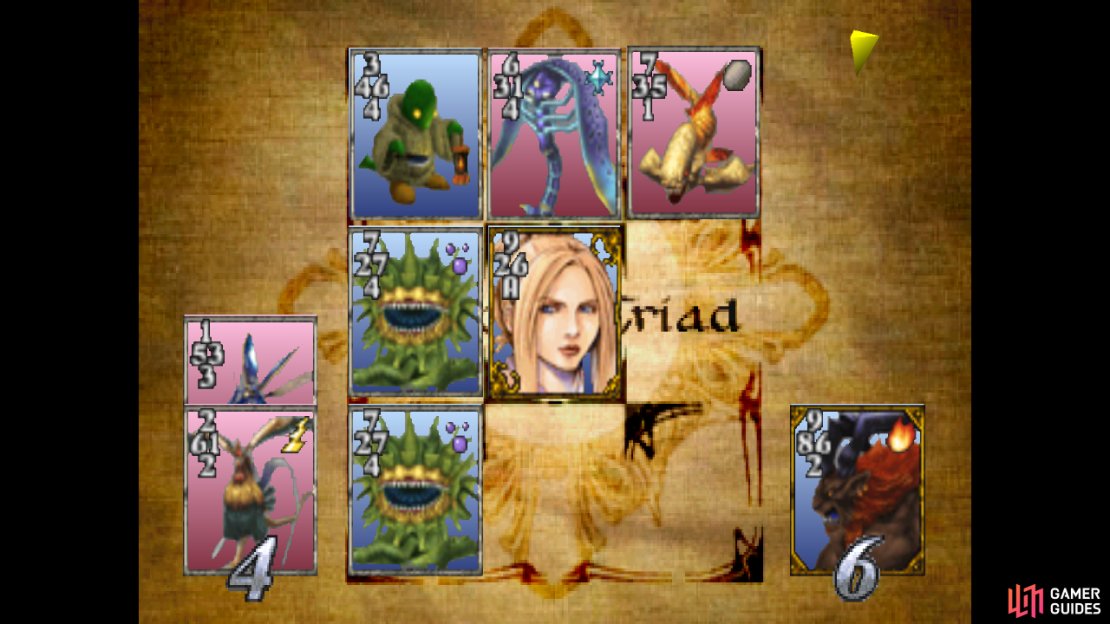

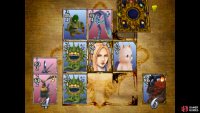
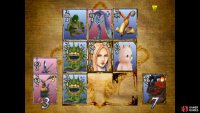

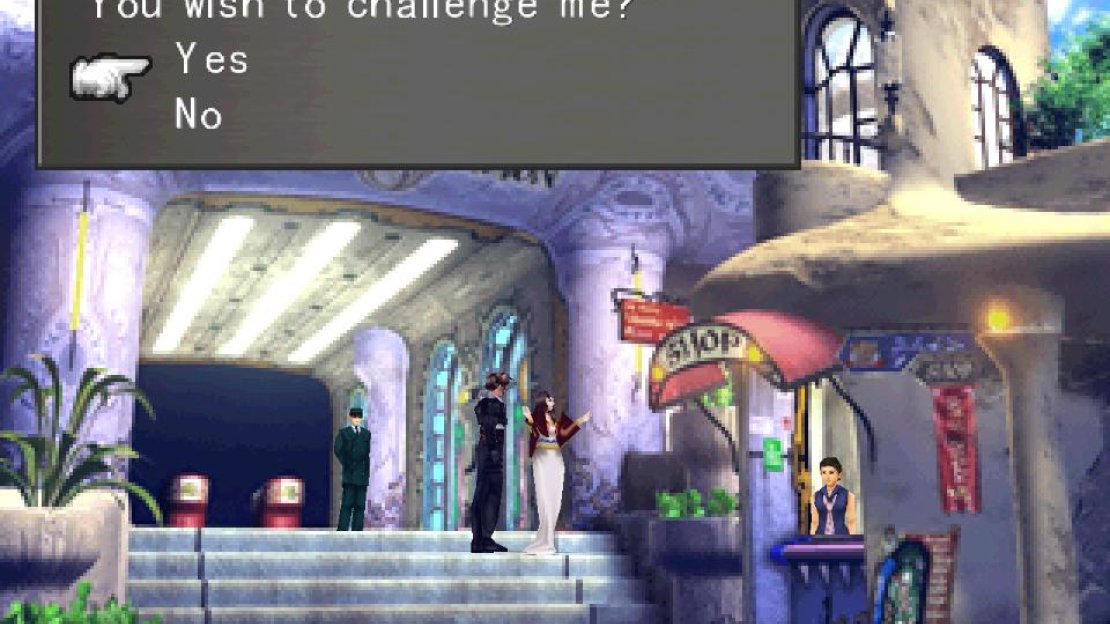

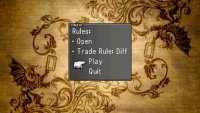
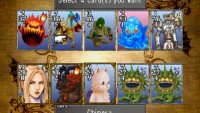
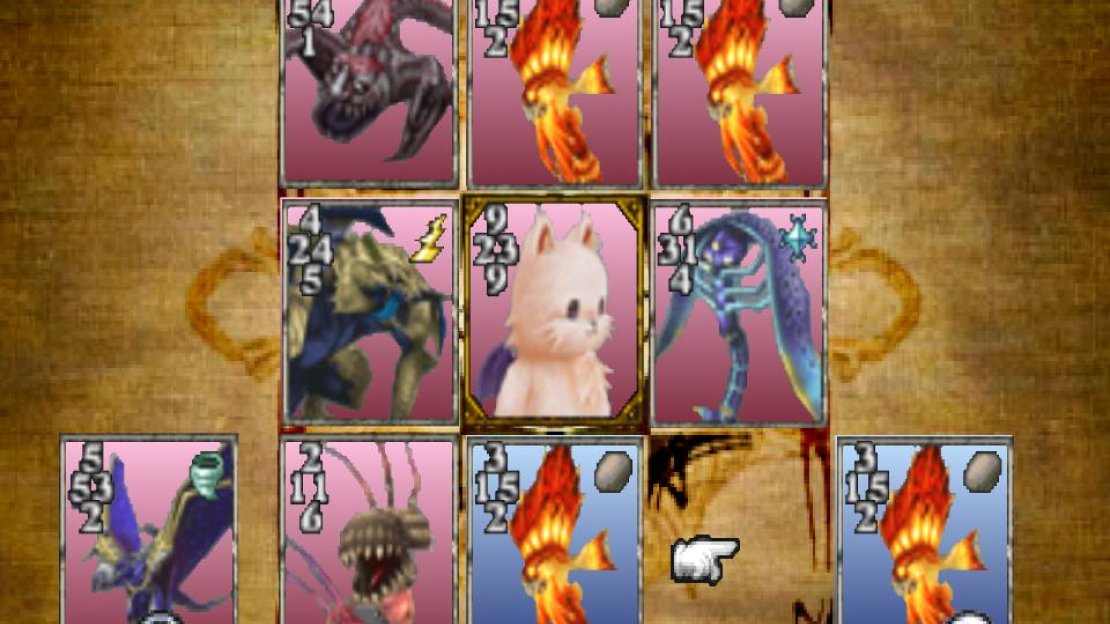

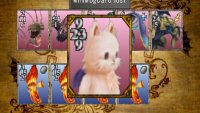
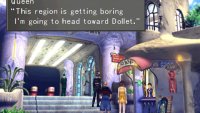
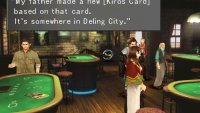
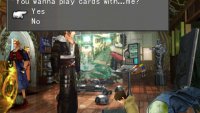
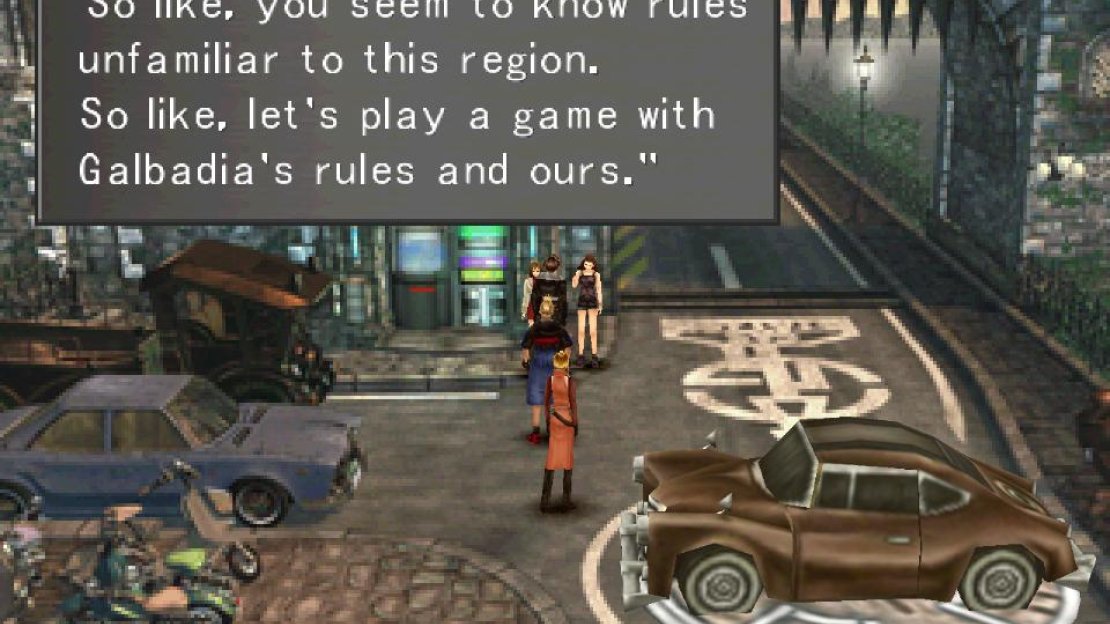

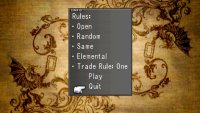

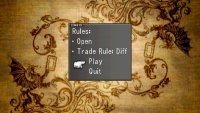
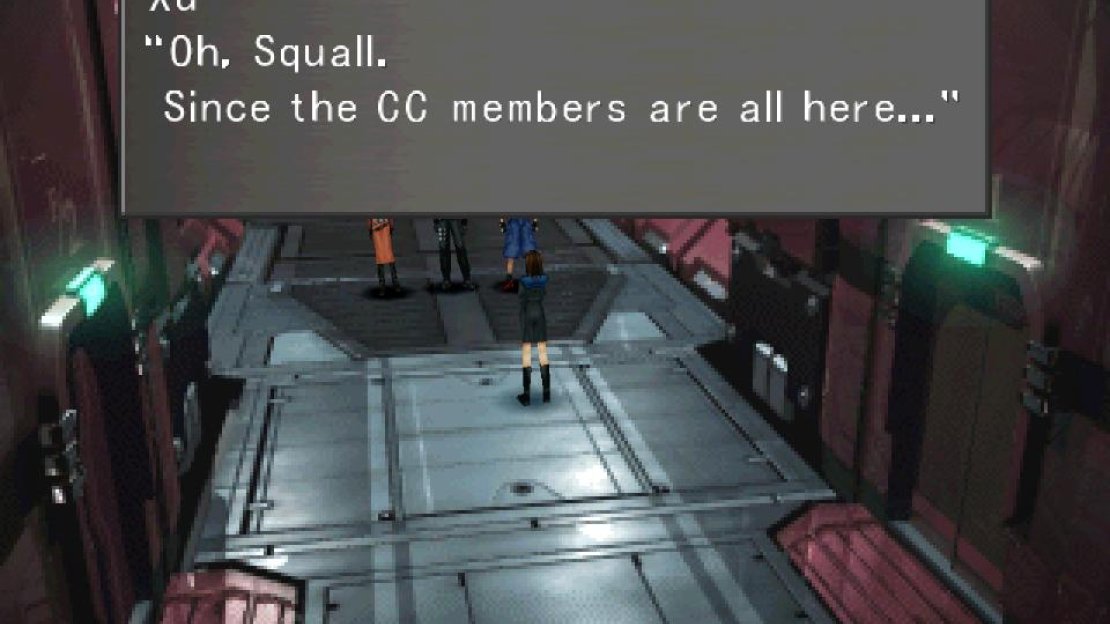


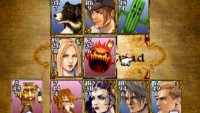
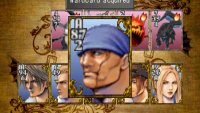
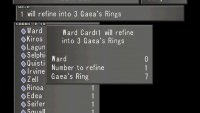
No Comments